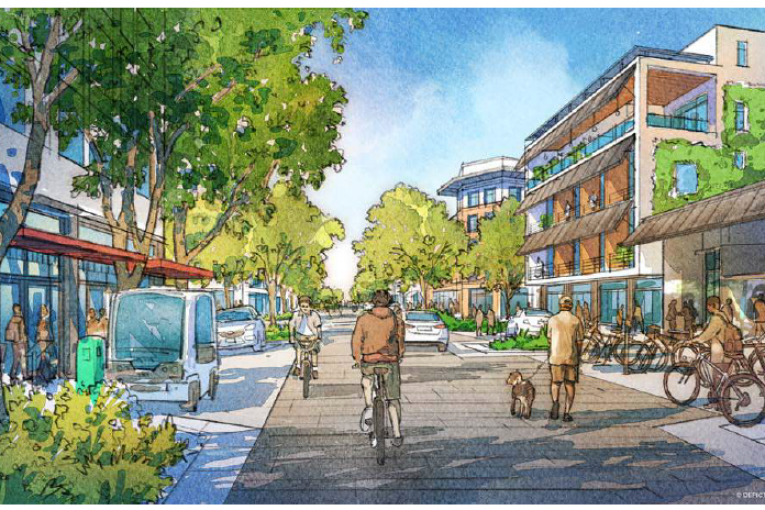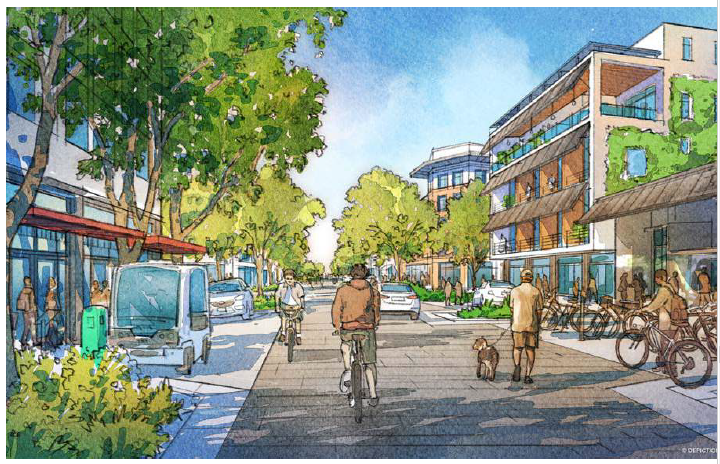

By Lauren Smith
DAVIS — On Monday Oct. 26, the Davis Vanguard hosted a Downtown Plan Webinar where panelists Meg Arnold, chair of the Downtown Plan Advisory Committee (DPAC), Larry Guenther, City Council candidate for District 3, Heather Caswell, business owner of The Wardrobe, and Matt Kowta, consultant to the Downtown Plan Advisory Committee, discussed different aspects of the downtown plan such as sustainability and accessibility.
The webinar was in a question and answer format.
The first question asked for the panelists’ thoughts on the downtown plan and what concerns they have regarding it.
As chair of DPAC, Meg Arnold was concerned about community engagement, making sure a wide range of opinions were heard, and that the “broader public process also was robust.” However, she stated that she was “very pleased with the fullsuit if engagement opportunities and the number of residents who did provide their input.”
Heather Caswell stated, “I am really not a fan of the seven stories.” Instead, she prefers “five stories and no higher.” Caswell also placed a high emphasis on “bioregional color” and stated that “sustainability needs to be an essential part of design considerations.”
Larry Guenther raised concerns over costs, stating, “We never get to see those numbers.” He also discussed the need for incorporating a residential aspect to downtown and the need to focus on the “economic ecosystem.” Guenther encouraged business diversity ordinances and making sure there are spaces specifically for local businesses.
The next question was addressed to Meg Arnold regarding the “key priorities” of DPAC.
Arnold stated that the main focus of DPAC included walkability, bike access, sustainability, and accessibility.
In response to a question addressed to Larry Guenther about his concerns about density, parking and transitions, Guenther spoke about the potential for the downtown plan to endanger historic homes.
He is hoping that neighborhoods impacted by the plan will have an increased number of permits to park along the streets and designate more parking in neighborhoods. Guenther also spoke about using Third and Fourth Streets, syaing a “primary corridor is desirable.” He acknowledged that there would be an increased amount of traffic in those areas; however, he stated that there need to be “calming measures” implemented.
A question addressed to Heather Caswell asked what her concerns were about parking as a business owner.
Caswell stated that “underground parking is attractive in certain areas” and also supported the idea of three hour parking spaces rather than two hours or less. She also stated that she supports “more parking on the edges versus too centralized… I like the idea of walking.”
Matt Kowta answered a question that addressed affordable housing downtown, regarding its feasibility and issues surrounding it.
Kowta stated that “there are inherent challenges in doing infill and redevelopment,” especially at market rate. Despite the fact that Kowta thinks the downtown area is a “really great place,” for residents who live in affordable housing to benefit from living close to downtown, the financial capability of creating affordable housing “under the conditions” of mixed income levels is “very difficult to do.”
The next question asked to all panelists stated, “The proposed plan reflects two years of work and several years even before that of general thinking prior to the pandemic. Now we have a pandemic which has the potential to change a lot of things going forward. Should we start incorporating some of these concerns into the plan before we pass it?”
Both Arnold and Kowta voiced a “deep hesitancy to speculate” about how COVID-19 will impact the downtown plan and that it is “overly speculative” to be reactive to COVID-19. However, one public commenter disagreed with them. They stated that building an assumption that another pandemic is coming into the downtown plan is a good idea.
Larry Guenther stated that another pandemic will be “very likely some of the time.” He stated that using big and open public spaces and “spilling into public spaces” has saved some business and encouraged further use of those strategies.
Matt Kowta stated that there is some flexibility in how spaces are used. He also stated that there is a need to maintain “nimbleness in the process” and allow for adaptation of spaces.
To address environmental impacts and sustainability of the downtown plan, the next question asked how these elements will be implemented and how the plan will execute potential elements of the forthcoming climate action and adaptation plan.
Arnold spoke about the 10 sustainability themes in the downtown plan, some of which include mobility, living landscape, education, energy and water. She also stated that the plan “illustrates examples of how sustainability can be built in in different ways on different scales,” for example single level projects or district level projects. Arnold also stated that it is vital for the city of Davis to undertake prioritizing sustainability with as much community engagement as possible.
The last question asked about how fiscally realistic the downtown plan is in the absence of the redevelopment fund.
“The plan is going to be something that happens incrementally over time… I don’t expect there is going to be a landslide of activity” Kowta stated. He also mentioned that there have been some discussions over potential developments and stated that “we may see an initial burst of activity…this is the nature of redevelopment of infill within an already developed area. Things just don’t happen overnight, it takes time.”
Kowta also stated that developers are stating that they “just need to know what the ground rules are going to be, we need to have a clear picture of what it is that’s expected of us and what we’re going to be able to do and then we can plan projects accordingly.”